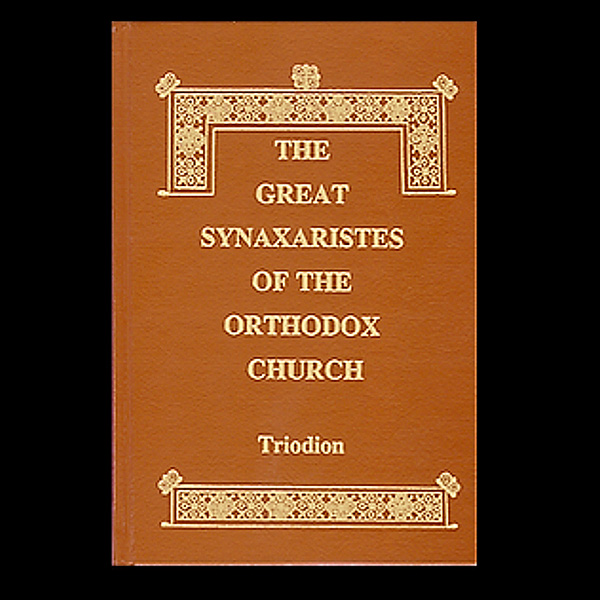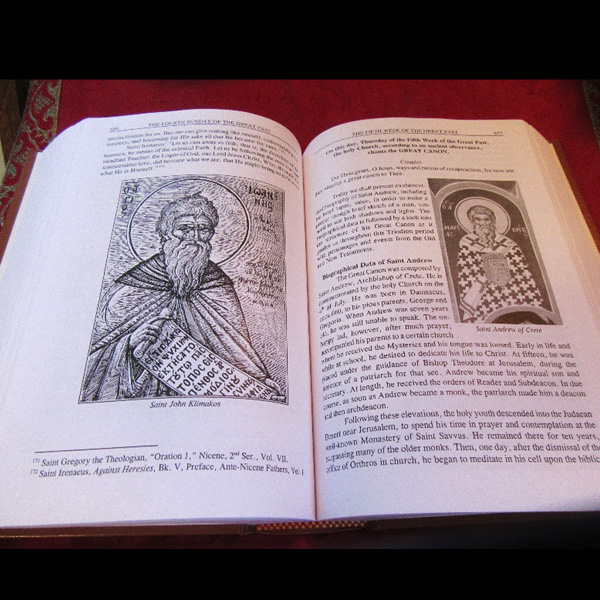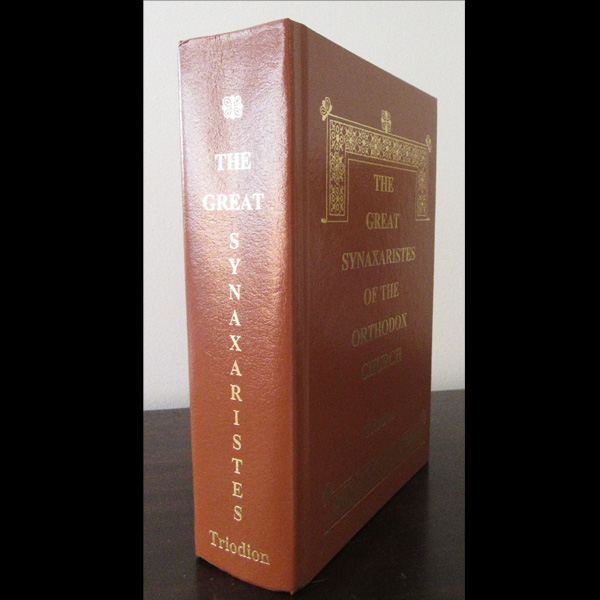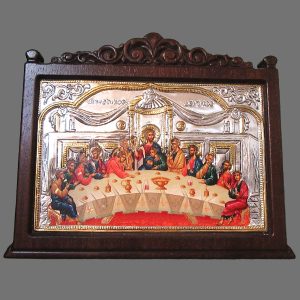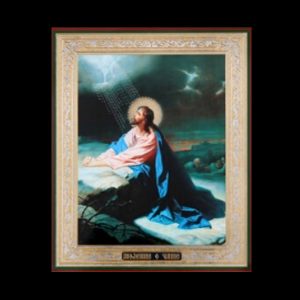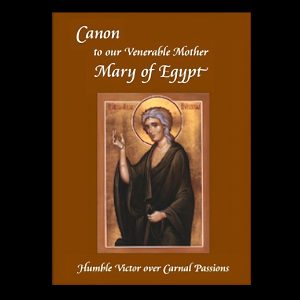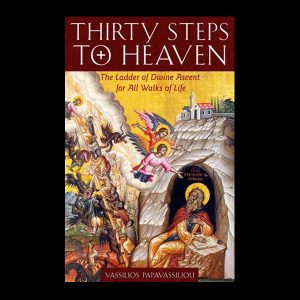A comprehensive and authoritative text, translated from Greek.
Covers the Sunday of Zacchaeus through the Vesperal Liturgy of Holy Saturday.
A multitude of topics such as the Antichrist and the End Times, martyrs in the End Times, modes of fasting,
biographies of key figures during the Fast, Synodikon of Orthodoxy, Epistle and Gospel commentaries and homilies,
questionnaire on Confession, and much more. A MUST for any Orthodox library!
Hardbound, 1,224 pages
From the text of The Synodikon of Orthodoxy:
Brief Synopsis of Who’s Who Among the Acclaimed
Eternal memory to the Hierarchs and Champions and Teachers of Orthodoxy!
Germanos (patriarchal tenure from 715 to 730, commemorated individually on the 12th of May): he was the former Bishop of Kyzikos. As patriarch, he was devoted to the Virgin Theotokos and came into conflict with Leo III’s policy of Iconoclasm. Germanos was also a hymnographer who composed canons
Tarasios (784-806, commemorated the 25th of February): The former layman and high-ranking secretary of Empress Irene was selected by her as the successor of Patriarch Paul IV, since Tarasios also wished to promote the restoration of icon veneration. Irene and Tarasios convoked the Second Synod of Nicaea in 787 and abolished Iconoclasm.
Nikephoros (806-815, commemorated the 2nd of June): The son of a confessor who suffered exile he was the former secretary to Irene and Constantine VI. He retired and founded several monasteries on the eastern shore of the Bosporos. He returned to the city where he was appointed director of the largest poorhouse. As patriarch he refused to sign the decision of the iconoclast council for which he suffered banishment to one of his monasteries. Several works were penned by him defending the icons as well as a chronology. He reposed at the monastery of Saint Theodore near Chrysopolis.
Methodios (843-847): born in Syracuse he came to Constantinople to continue his education. He preferred to enter the Chenolakkos Monastery in Bithynia where he was eventually made superior. He journeyed to Rome to represent Patriarch Nikephoros I who was deposed by the iconoclasts. Upon Methodios’ return in 821 he was exiled by the iconoclast government. With the death of Emperor Theophilos, he was elected patriarch. He restored, together with Empress Theodora and the eunuch Theoktistos, the veneration of icons in the year 843 at the Triumph of Orthodoxy: the final defeat of Iconoclasm. He filled many posts in the Church with iconodules. However, he was enjoined to excommunicate some of the radical Stoudite monks who wished severe punishments inflicted upon the heretics.
From the text on the Second Sunday of the Great Fast:
The holy Church commemorates our holy father among the saints, the Archbishop of Thessalonike, Gregory Palamas the Wonder-worker.
Our Saint Gregory Palamas contended in his fourteenth-century writings against the Trinitarian heresy of the Filioque and the soteriological heresy of the alleged created energies of God. As to the former heresy, he humbled the haughtiness of the Latins. As to the latter heresy, maintained by the Latin-minded Barlaam of Calabria who also opposed Orthodox hesychasm, he demonstrated its foolishness and nonsense. Gregory showed that the illumination on Mount Tabor was uncreated. He initiated many into the grace of noetic prayer. The Orthodox theology of Saint Gregory Palamas was upheld by the holy Synods convened in 1341, 1347, and 1351. Palamite writings on Orthodox theology proved to be an exposition on the Faith summarizing the preceding thirteen centuries of patristic tradition which were a rampart against western innovations and rationalism. This prelate himself was a preceptor of the divine energies, and a partaker of the uncreated and immaterial Light who explained that no one can participate in the essence of God but that the creation is able to participate in His grace and energy.
Barlaam of Calabria maintained the philosophical notion of the divine Simplicity, which he inherited from Augustine. This scholastic theology and philosophy did not allow any distinctions in God. Barlaam, therefore, attacked the patristic differentiation between incommunicable essence and communicable energies. Barlaam said, “Only the essence of God is uncreated and unoriginate, but every energy is created.” Our holy father, Saint Gregory Palamas, answered in writing: “What impiety! It follows from this that God has no natural and essential energies. This amounts to openly denying the essence of God! For the saints clearly state in conformity with Saint Maximos, that no nature can exist or be known unless it possesses an essential energy. Alternatively it follows that there are divine energies, but that these, although natural and essential, are yet created; and, in consequence, the essence of God which possesses them is itself created. For the essence and the nature whose natural and essential energies are created is itself created and made known as such.”
If the uncreated energies are not differentiated from the essence of God, all sorts of absurdities arise. Saint Gregory said: “If the divine energy is in no way differentiated from the divine essence, then the act of creation also will be confused with Him Who is begotten and Him Who proceeds; … and so the Son of God and the Holy Spirit will not be differentiated from the creature which will likewise be generated by and proceed from God the Father; thus, will the creation be compounded with God and God numbered among His creatures.” Another failure that arises from not making the distinction between the essence and the energies, such as will and foreknowledge, is the following: “If the essence and will and knowledge are the same in the Trinity, then the divine energies are in no way distinct from the divine essence; and neither will they be distinct from each other. Thus, the will of God will not be distinct from His foreknowledge, which means that either God does not foreknow all things because He does not will all that occurs, or else He wills evil also, because He foreknows it.”
Therefore, “If the divine essence does not in any respect differ from the divine energy, then neither does it differ from the divine will. Thus the Son, Who alone is begotten from the Father’s essence, is according to these people also created from the Father’s will.
“If the divine essence does not in any respect differ from the divine energy, and if the holy fathers testify that God has many energies – for, as shown above, He has creative providences and goodnesses – then God also has many essences. This is a view that no member of the Christian race has ever uttered or entertained.
“God Himself is within Himself, since the three divine hypostases co-naturally and eternally cleave to one another and unconfusedly interpenetrate each other. Yet God is also in the universe and the universe is within God, the one sustaining, the other being sustained by Him. Thus all things participate in God’s sustaining energy, but not in His essence. Hence the theologians say that divine omnipresence also constitutes an energy of God.”
Uncreated light, according to the teaching of Saint Gregory Palamas and of the hesychasts in general, is the divinizing gift of the Holy Spirit. This light is not only visible to man but is participable by him, and participating in it he is divinized. The saint writes: “Those who have pleased God and reach that for which they came into being, namely, theosis (divinization, that is, participation in the uncreated energies, not the essence which the word ‘deification’ connotes) – for they say it was for this cause that God made us, in order that we be made partakers of His own divinity – even such as these are in God, as they are divinized by Him and He is in them since He is divinizing them. These also participate in the divine energy, though in another manner, but they do not participate in the essence of God. Therefore, also, the theologians state that divinity is a name for the divine energy.”
God lets Himself be seen face to face, and not through enigmas. He unites Himself to them to the extent of coming to dwell in His entirety in their entireties, so that, on their side, they dwell completely in Him and, through the Son, the Spirit is poured out richly on them. …

